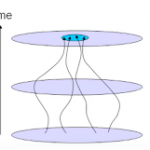 Sean Carroll’s Oxford lecture on Poetic Naturalism is worth watching (below). In many ways it just reiterates several common themes. First, it reinforces the is-ought barrier between values and observations about the natural world. It does so with particular depth, though, by identifying how coarse-grained theories at different levels of explanation can be equally compatible with quantum field theory. Second, and related, he shows how entropy is an emergent property of atomic theory and the interactions of quantum fields (that we think of as particles much of the time) and, importantly, that we can project the same notion of boundary conditions that result in entropy into the future resulting in a kind of effective teleology. That is, there can be some boundary conditions for the evolution of large-scale particle systems that form into configurations that we can label purposeful or purposeful-like. I still like the term “teleonomy” to describe this alternative notion, but the language largely doesn’t matter except as an educational and distinguishing tool against the semantic embeddings of old scholastic monks.
Sean Carroll’s Oxford lecture on Poetic Naturalism is worth watching (below). In many ways it just reiterates several common themes. First, it reinforces the is-ought barrier between values and observations about the natural world. It does so with particular depth, though, by identifying how coarse-grained theories at different levels of explanation can be equally compatible with quantum field theory. Second, and related, he shows how entropy is an emergent property of atomic theory and the interactions of quantum fields (that we think of as particles much of the time) and, importantly, that we can project the same notion of boundary conditions that result in entropy into the future resulting in a kind of effective teleology. That is, there can be some boundary conditions for the evolution of large-scale particle systems that form into configurations that we can label purposeful or purposeful-like. I still like the term “teleonomy” to describe this alternative notion, but the language largely doesn’t matter except as an educational and distinguishing tool against the semantic embeddings of old scholastic monks.
Finally, the poetry aspect resolves in value theories of the world. Many are compatible with descriptive theories, and our resolution of them is through opinion, reason, communications, and, yes, violence and war. There is no monopoly of policy theories, religious claims, or idealizations that hold sway. Instead we have interests and collective movements, and the above, all working together to define our moral frontiers.